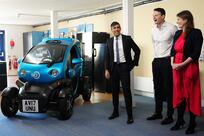BERLIN// Angela Merkel, dubbed Mutti or Mummy in the German media, is expected to win the federal election this month because she has successfully nursed Germany through the financial crisis and voters have grown accustomed to her sober, unconfrontational style.
The chancellor has been waging the dullest election campaign in living memory, likened by frustrated media columnists to a cotton-wool fight, in which she has praised her challenger, the foreign minister, Frank-Walter Steinmeier of the centre-left Social Democrats (SPD), and is wooing voters with soppy billboard slogans such as: "For a New Togetherness" . Mrs Merkel and her conservatives have governed in an uneasy coalition with the SPD for the past four years and opinion polls indicate that she will remain chancellor after the September 27 election, either in a repeat of the current constellation or in an alliance with her preferred partner, the pro-business Free Democrat Party.
"In the economic crisis people don't really want a combative campaign," Manfred Güllner, director of Forsa, one of Germany's leading polling institutes, said in an interview. "Mrs Merkel with her non-campaign seems to be striking a chord with people more than the SPD, which is trying desperately to find battlegrounds to attack her. But it's all simply bouncing off her." Her position seems so strong that commentators have added a new word to the German language to describe her: Übermutti.
Mrs Merkel and Mr Steinmeier will face each other in a televised debate tonight that will be aired on the four main TV channels and is expected to attract 20 million viewers - one quarter of the population. In the 2002 and 2005 federal elections, such debates helped decide the election outcome, but few pundits expect Mr Steinmeier, who has failed so far to shed his image as a grey bureaucrat, to land any killer punches.
"This election campaign is being waged without passion, largely because the contenders are rather pale," Richard Schütze, a communications consultant who coaches politicians and business people, said. "Both are modest and haven't a shred of vanity. Neither tends to polarise or engage in polemics. So it's likely to be a pretty tired TV debate." There are good reasons for the lack of vitriol in the campaign - the two biggest parties worked well together to tackle the worst recession since the 1930s with an unprecedented programme of corporate bailouts and stimulus packages. They agree on such major issues as the economy, climate change and foreign policy, and they are avoiding below-the-belt attacks because they may have to share power again if there is no viable alternative for a stable coalition.
The entire political spectrum has shifted to the left in recent years because all parties know that German voters will not tolerate radical welfare cuts and pro-business reforms that hurt workers. After four years of consensus politics, neither Mrs Merkel nor Mr Steinmeier lend themselves as hate figures for the Left or Right. It is a far cry from Helmut Kohl's days as chancellor, when he was regularly pelted with eggs from whistling left-wing activists at campaign rallies, or Willy Brandt of the SPD, whose foreign policy made conservative blood boil.
Mrs Merkel's nearly unassailable position was highlighted in last week's parliamentary debate on Afghanistan after a much-criticised Nato air strike called in by a German army commander on two hijacked fuel tankers on Friday. Afghan rights organisations estimate between 60 and 70 civilians were killed, and the war has dominated the campaign since the bombing. Mr Steinmeier had no option but to echo her speech affirming Germany's commitment to keep its 4,200 troops in Afghanistan for as long as necessary, and to adhere to a planned international agreement on a withdrawal.
Even though more than 60 per cent of Germans oppose the Afghan mission, most of the main parties agree with Mrs Merkel's stance on Afghanistan. The only exception is the Left Party, which has consistently called for an immediate pullout of German troops, and which is set to benefit from the Afghan debate, at the expense not of Mrs Merkel, but of the SPD. Mindful of Barack Obama's successful use of the internet in his campaign, all the German parties have been embracing Facebook and Twitter to woo younger voters, and TV stations have adopted the US-style town hall format in which a candidate takes questions from an invited audience.
But both Mrs Merkel and Mr Steinmeier lack the rhetorical skill and the charisma to whip up emotions in TV appearances or at campaign rallies. Mrs Merkel's reserved, quiet character is now part of her trademark rather than a weakness, analysts say. Journalists for the tabloid newspaper Bild am Sonntag who travelled with the chancellor to her home town of Templin in the hope of gaining insight into the pastor's daughter came back with little more than an admission that she liked to pick blueberries as a child and enjoys the silence of nature.
foreign.desk@thenational.ae






